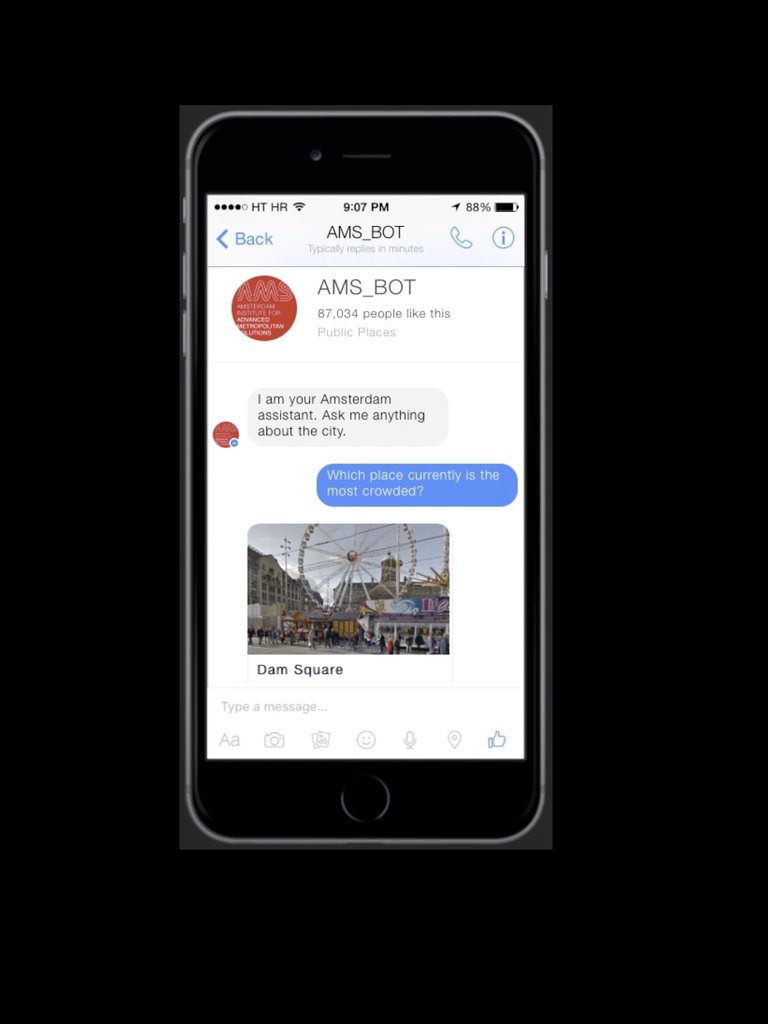
‘The role of data will only become more important’
Alessandro Bozzon discussing the role of data within AMS Institute
By: Jurjen Slump
Chatbots that provide the public with real-time information on gridlocks in the city. A bridge, connected to the Internet of Things (IoT), that records the number of people crossing it. A database containing the precise location of all the urban objects in the city. Data play a big role in cities - and will only become more important. Obviously, data also play a significant role within AMS Institute’s projects.
“Ultimately, it’s all about good decision-making”, says data scientist Alessandro Bozzon. He heads AMS Institute’s Urban Data Science Team. “You want to know what’s going on in the city, what kind of policy needs to be pursued. And for this you need a lot of information.” The goal is to use data to improve the quality of life. “Our job is to enable citizens, administrators, and scientists to extract actionable knowledge from data.”
SocialGlass
Bozzon and his team are involved in all projects involving data. They ensure that the data are collected in an optimal manner, so that they can be properly integrated within various applications. In addition, the Urban Data Science Team develops ground-breaking innovations. A well- known project called ‘SocialGlass’ provides a readily available technical infrastructure to integrate in real time streams of urban data, for instance from social media applications such as Twitter and Instagram.
On their smartphones, visitors and residents generate gigabytes of information each day about their activities in the city, and about their (social) environment. SocialGlass is a tool that enables policy makers to analyse this information in real time. Technologies such as machine learning and spatial data mining are used for this. As a result, it is possible for traffic engineers to work towards the prediction of the course of visitor flows in the city. SocialGlass was successfully used for instance, to monitor visitor crowds during the SAIL Amsterdam event in 2015, in a collaboration with the ALLEGRO team led by professor Serge Hoogendoorn. ALLEGRO is another project of the AMS Institute, aimed at establishing a comprehensive theory of active mode behaviour, considering the different behavioural levels for pedestrians and cyclists in cities.

Chatbots
One of the components of SocialGlass is a chatbot that answers visitors’ questions about, for example, how busy a particular location in the city is. The new feature of the chatbot is that it can ask users questions in return. This also provides valuable information for the city and other users. All these data are combined and analysed in the City Simulation Lab where, for example, tourist flows can be simulated and predicted with high accuracy.
Our job is to enable citizens, administrators, and scientists to extract actionable knowledge from data
Privacy
Of course, collecting all these data will have privacy implications, but this aspect has been given careful consideration. Bozzon emphasises that everything is in accordance with the new European privacy regulations. What’s more, the data are processed in a privacy- by-design manner, so that it cannot be traced back to individuals. Bozzon’s team includes about 10 people. Also, he is an associate professor affiliated to the faculty of Electrical Engineering, Mathematics and Computer Science at Delft University of Technology. At the university, another 10 people are working indirectly on topics related to AMS Institute’s projects. This includes research on crowd computing and human-centred artificial intelligence, i.e. intelligent systems working together with people.
Catalyst
The partnership within AMS Institute is an amazing catalyst for collaboration, both with other
knowledge partners and companies and within Delft University of Technology. “We work together with the Civil Engineering, Industrial Design and Engineering, and Architecture and Built Environment faculties”, he elaborates. “Since we are all working on issues with tangible impact on the life of people, all the usual collaboration barriers disappear.”
The future
Bozzon expects data to become ever more important in the next few
years. “We are still in the early stages in terms of the role that data are going to fulfil in the decision-making process.” The Internet of Things is also expected to take a big leap forward, with increasingly intelligent devices generating valuable data. Consider, for example, self-driving cars that supply data for mobility issues. Or the previously mentioned MX3D Bridge, where IoT sensing infrastructure developed by the team
of professor Gerd Kortuem will provide information about the bridge’s status and usage, in real time. Artificial intelligence will also claim a bigger role, so there will have to be a strong focus on ethical issues. “You need
to make sure that people don’t feel excluded.”
Education
In short: there’s enough to keep Bozzon and his colleagues busy in the coming years. In addition, it is important that the field of education focuses sufficient attention on data and how to handle them. “At Delft University of Technology and within AMS Institute, we’re training the next generation of engineers and professionals. Data are the alpha and
omega within this field. It is therefore important for students to understand how to handle these data in a correct and responsible manner. This is just as important as knowing how to program software – maybe even more so.”